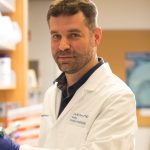
Funded in partnership with the Kansas City Chiefs Football Club
Modern cancer treatments cause serious side effects and often fail. Cancers often contain rare stem cells that resist treatments and cause the cancer to come back. At that point, cancer becomes even more difficult to treat. In children, leukemia is the most common type of cancer, and treatment failure occurs in about one in four patients. This situation has remained essentially unchanged for decades, which indicates an urgent need to develop new treatments focused on eliminating cancer stem cells.
Two genetic pathways, which are among the most commonly activated in human cancer, interact to drive cancer stem cell development and resistance to therapy. Surprisingly, we found that a certain common chemotherapy drug can inhibit the cancer stem cell driving interaction of these pathways at low doses. Unlike current practice of using this drug to kill rapidly dividing cells, we changed its use to specifically target treatment resistant cancer stem cells in an animal model.
Cancer is normally held at bay by the immune system. Only when the immune system is undermined can cancer take hold. Our results indicate that the immune system can once again be activated against cancer stem cells. How it does so and how we might improve these responses in patients is mostly mysterious. Now, we will use single cell DNA sequencing to obtain a large scale view of immune effects of our new treatment. This will eventually inform the design better treatments.

Funded in partnership with the Kansas City Chiefs Football Club
The immune system can destroy cancer cells. This is being taken advantage of in cancer therapy, with scientists trying to find ways to activate the immune system to better kill cancer cells. One therapy involves the infusion of immune cells named natural killer (NK) cells. This therapy works well for some types of cancers. However, there has been limited success with this therapy against most tumors. The ultimate goal of our research is to increase the ability of this therapy to work against more cancers. One method proposed for making NK cells better at killing cancer cells is treating the cells with activating signals that are termed IL-12, IL-15, and IL-18. We show that this makes the NK cells express proteins that affects the ability of the cells to kill cancer cells. This leads us to think that IL-12,15, and18 treatment alters NK cells in a way that can be good for the treatment of some, but bad for other, types of cancer. This is of high concern because IL-12,15,18 treatment is proposed as a way to enhance NK cell treatment of cancers and is being tested in patients. Therefore, it is critical we determine how IL-12,15,18-treated NK cells affect the growth of different types of cancer. Here we propose to determine how IL-12,15,18-treatment, and the proteins this treatment induces on NK cells, alters the ability of NK cells to kill cancer in mouse models.

Funded in partnership with the Kansas City Chiefs Football Club
Like smoking for lung cancer, infection by Helicobacter pylori (Hp) is the major risk factor for gastric cancer (GC). However, only <3% of those infected by Hp develop GC. We hypothesized that the interactions among Hp strains and/or between Hp and non-Hp microbes may affect their interaction with humans, therefore modify host clinical outcomes. We aim to find GC-associated microbial features that define the steps leading to GC. The results of this study will provide critical insights into the causes of GC. This study will also provide potential novel biomarkers to identify subjects at high risk or with early stage of GC, enabling interventions to reduce GC incidence and mortality.

Funded in partnership with the Kansas City Chiefs Football Club
Recent successes demonstrate the power of using the immune system clinically to destroy cancer. One such therapy involves the infusion of cells called natural killer (NK) cells. This therapy works well for blood cancers. However, there has been limited success with this therapy against solid cancers. The ultimate goal of our research is to increase this efficacy. NK cell killing occurs when receptors expressed on the NK cells are bound. One of these receptors, Natural killer group 2 member D (NKG2D), plays a critical role in the killing of cancers in both mice and humans. My lab has recently generated data that indicate there is a role for NKG2D-binding partners expressed on NK cells in cancer destruction. We demonstrate that upon activation, human and mouse NK cells express these binding partners on the cell surface. We further show that this alters the secretion of factors that play critical roles in cancer destruction. We propose to test the hypothesis that expression of these NKG2D binding partners alters the ability of NK cells to kill cancer cells and that manipulation of this expression can be used to increase the efficacy of NK cell therapy. We will use mouse models to test this hypothesis with both mouse and human NK cells and cancers. At the completion of these studies we will know 1) whether expression of NKG2D binding partners by NK cells affects NK cancer therapy and 2) whether manipulation of this expression is likely to increase the efficacy of clinical NK therapy.

V Scholar Plus Award – extended funding for exceptional V Scholars
Breast cancer is the most common cancer in women. Despite advances in understanding how breast cancer develops, this has not translated into better therapies. The majority of breast cancers are positive for hormone receptors, such as the estrogen and progesterone receptor (PR), and are dependent on these receptors and their hormone ligands (estrogen and progesterone) for growth. However, as tumors progress they become hormone-independent, meaning they grow in the absence of hormones normally required for cell growth, perhaps due to unregulated hormone receptors. It was recently shown that women who were taking hormone replacement therapy that included progesterone had an increased risk of developing breast cancer, underscoring the importance of studying PR in breast cancer. Understanding PR action in the context of breast cancer is important to the development of better therapies.
PR is required during normal breast development and pregnancy, activating genes in the nucleus that stimulate cell growth. Recently, we identified that PR also regulates genes that drive inflammation, a normal cellular process that can function uncontrollably in cancer, generating mutations that may drive cancer growth. Decreasing inflammation has been shown to reduce the risk of developing breast cancer. The objective of the proposed experiments is to determine how PR regulates genes involved in inflammation, and if PR-dependent inflammation can be detected, and eventually blocked, in breast cancer. Understanding how PR regulates inflammation could lead to the development of a new area of therapies for breast cancer, combining currently existing hormone-based therapies with treatment aimed at reducing inflammation

Breast cancer is the most common cancer in women. Despite advances in understanding how breast cancer develops, this has not translated into better therapies. The majority of breast cancers are positive for hormone receptors, such as the estrogen and progesterone receptor (PR), and are dependent on these receptors and their hormone ligands (estrogen and progesterone) for growth. However, as tumors progress they become hormone-independent, meaning they grow in the absence of hormones normally required for cell growth, perhaps due to unregulated hormone receptors. It was recently shown that women who were taking hormone replacement therapy that included progesterone had an increased risk of developing breast cancer, underscoring the importance of studying PR in breast cancer. Understanding PR action in the context of breast cancer is important to the development of better therapies.
PR is required during normal breast development and pregnancy, activating genes in the nucleus that stimulate cell growth. Recently, we identified that PR also regulates genes that drive inflammation, a normal cellular process that can function uncontrollably in cancer, generating mutations that may drive cancer growth. Decreasing inflammation has been shown to reduce the risk of developing breast cancer. The objective of the proposed experiments is to determine how PR regulates genes involved in inflammation, and if PR-dependent inflammation can be detected, and eventually blocked, in breast cancer. Understanding how PR regulates inflammation could lead to the development of a new area of therapies for breast cancer, combining currently existing hormone-based therapies with treatment aimed at reducing inflammation.









